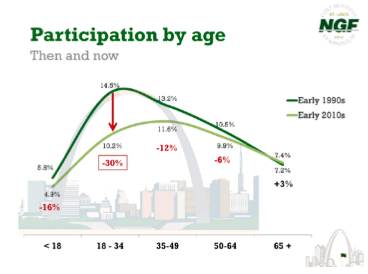 While the death of golf may not be
immediately imminent, there is an increasing decline in the number of amateur
golfers in both the US and the UK, with clubs in England losing twenty percent of its members between 2004
and 2013 and Scotland losing fourteen percent of its membership.
This decline is mainly down to disinterest
in golf among young people, particularly those born after the millennium: the
number of young people regularly playing golf have almost halved between 2010
and 2013. The reasons cited tend to be the cost of playing, the time it takes
to play and the perception that golf is for ‘snobs’ or the elite.
While the death of golf may not be
immediately imminent, there is an increasing decline in the number of amateur
golfers in both the US and the UK, with clubs in England losing twenty percent of its members between 2004
and 2013 and Scotland losing fourteen percent of its membership.
This decline is mainly down to disinterest
in golf among young people, particularly those born after the millennium: the
number of young people regularly playing golf have almost halved between 2010
and 2013. The reasons cited tend to be the cost of playing, the time it takes
to play and the perception that golf is for ‘snobs’ or the elite. Unlike other sports, golf does not necessarily reflect children
of the millennial’s values, such as diversity, instant gratification,
affordability and inclusion. The high cost of playing prevents those in low
incomes, such as students or lower middle class families, from playing on both
a casual and permanent basis and women have historically been excluded from
golf clubs, meaning it is now an extremely male oriented sport.
On top of this, the smart attire demanded
by golf courses are stereotypically upper class, with few teenagers or
individuals on a lower income owning smart wear outside of school. Golf
specific clothing can be expensive, as can golf equipment which is required to
play the game.
When taking all this into account, isn't it
reasonable to suggest that the future of golf depends on the need to modernize
its somewhat traditional and upper class values?
Here are a few ways we believe golf can be modernized to create a more friendly experience for all:
By changing golf traditions, such as
relaxing the dress code, the sport’s reputation may be less ‘stuffy’ and
therefore more enticing to younger generations and individuals from a less
privileged background.
Reducing prices will open up the game as a possibility
for more families and individuals while allowing those who already enjoy golf to
play more often.
While some might argue that golf is so great because of its
classic heritage and traditions, it is surely more beneficial to adopt modern
values and avoid the further decline of the golfing industry.
Another way of increasing the popularity of
golf could be to shorten the playing time of a round.
Unlike other sports, golf does not necessarily reflect children
of the millennial’s values, such as diversity, instant gratification,
affordability and inclusion. The high cost of playing prevents those in low
incomes, such as students or lower middle class families, from playing on both
a casual and permanent basis and women have historically been excluded from
golf clubs, meaning it is now an extremely male oriented sport.
On top of this, the smart attire demanded
by golf courses are stereotypically upper class, with few teenagers or
individuals on a lower income owning smart wear outside of school. Golf
specific clothing can be expensive, as can golf equipment which is required to
play the game.
When taking all this into account, isn't it
reasonable to suggest that the future of golf depends on the need to modernize
its somewhat traditional and upper class values?
Here are a few ways we believe golf can be modernized to create a more friendly experience for all:
By changing golf traditions, such as
relaxing the dress code, the sport’s reputation may be less ‘stuffy’ and
therefore more enticing to younger generations and individuals from a less
privileged background.
Reducing prices will open up the game as a possibility
for more families and individuals while allowing those who already enjoy golf to
play more often.
While some might argue that golf is so great because of its
classic heritage and traditions, it is surely more beneficial to adopt modern
values and avoid the further decline of the golfing industry.
Another way of increasing the popularity of
golf could be to shorten the playing time of a round. In comparison to sports such as football, golf is much more time consuming, both in the time it takes to play one game and the time it takes to master the skill. An 18-hole course can take as long as six hours to play, which is a very long time in modern times. Golf requires a lot of attention and does not normally have the adrenalin-causing excitement of other sports except of course, for that very motivating hole-in-one or eagle from the fairway...which is why we keep coming back, isn't it? Speeding up the game would prevent younger players from getting bored whilst playing a course. Rory McIlroy recently suggested that the grassroots level of golf needs speeding up in order to keep young golfers interest. One way which this could be done without causing significant changes to the structure of the game is by widening the holes used on golf courses. Whether you agree with these suggestions or not, one thing is for certain: golf, and all sport for that matter, needs to evolve with the changing values of the younger generation if it is to stay as prestigious and majestic as it has historically been. What are your thoughts? Speak out on this GFB blog, on Twitter @GamolaGolf , @Golf4Beginners or on our Facebook page.
Bio:
Gamola Golf is the leading discounted online golf store. It stocks the leading brands, products and golf accessories required for golfers of every ability, all at the best UK prices. photo credit: nextgengolf.org, camflan; via photopin; cc

